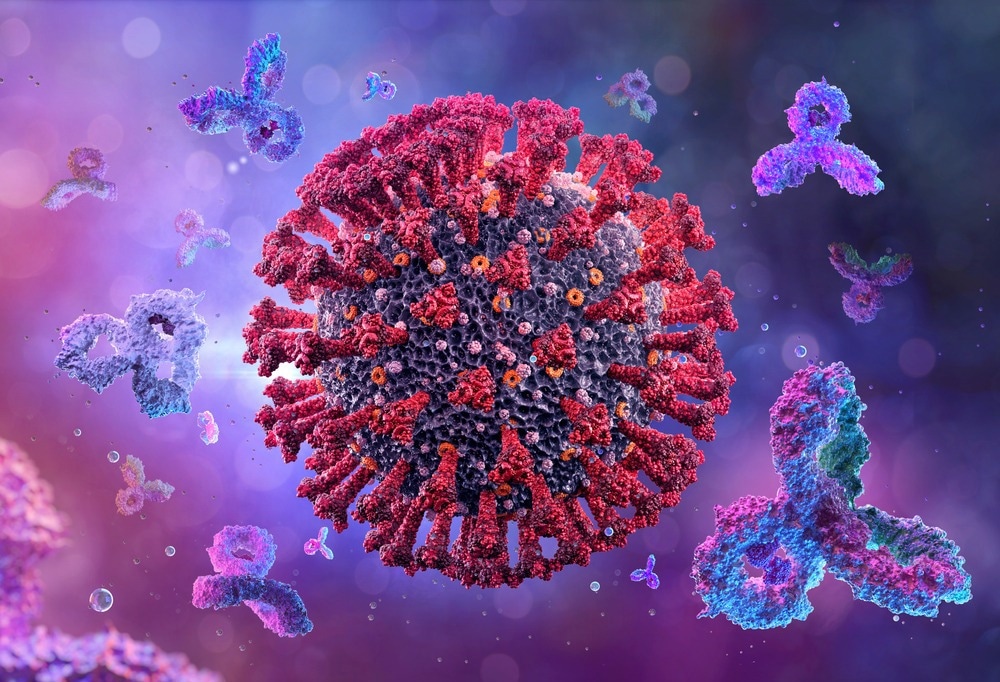In a recent study published in Vaccines, researchers evaluated the impact of monoclonal antibodies (mAbs) against severe acute respiratory syndrome coronavirus 2 (SARS-CoV-2) on maternal-fetal health.

Background
Antibodies eBook

Coronavirus disease 2019 (COVID-19) during pregnancy is associated with a higher risk for adverse outcomes. A multi-center study reported that 11% of pregnant individuals required intensive care, and 9.3% were on a mechanical ventilator. Further, infected females exhibit hypertensive disorders, small for gestational age children, and early pregnancy loss. Vaccination during pregnancy has been long debated and contentious, with low acceptance rates among pregnant individuals worldwide.
Monoclonal antibodies (mAbs) were introduced as a therapeutic option for non-hospitalized COVID-19 patients with mild/moderate illness. Using mAbs could reduce the auto-immune response against maternal/placental tissues, given that SARS-CoV-2 infection can trigger cytokine storms and autoantibodies. Clinical trials on mAb use in pregnancy are unavailable for ethical reasons, and overall safety data of anti-SARS-CoV-2 mAb use in pregnancy are limited.
About the study
The present study examined pregnancy outcomes after mAb treatment for COVID-19. A literature search in Web of Science, Cochrane library Embase, Medline, Scopus, and Ovid databases was performed using specific terms between December 1, 2019, and August 12, 2022. Search, eligibility, inclusion, risk of bias, and data extraction were performed by two authors.
Non-peer-reviewed studies were not considered. The team included all case series and retrospective studies evaluating pregnancy, maternal, and neonatal/fetal outcomes in a female population receiving mAbs for COVID-19. The Newcastle-Ottawa Scale was used for quality assessment, which gauges studies according to 1) selection and 2) comparability of study groups, and 3) ascertainment of outcomes.
Maternal, neonatal, fetal, and delivery outcomes were evaluated in pregnant individuals on mAb therapy. The primary outcome was the proportion of pre-term deliveries. Adverse events such as fetal distress, premature rupture of membrane (PROM), preeclampsia, etc., and maternal and neonatal outcomes, including neonatal resuscitation, jaundice, and death, among others, were also evaluated.
Findings
The researchers screened 53 articles and included 17 studies in the systematic review. Eight studies were conducted in the United States (US), four in Europe, three in Japan, and two in the United Arab Emirates (UAE). In total, these studies comprised 190 pregnant women with mild to severe COVID-19 who were treated with mAbs. mAbs were administered to 105 outpatients and 81 inpatients. One study did not specify out/in-patient status for four patients.
Quality assessment of studies revealed an overall good score for the selection/comparability of study groups and evaluation of outcomes. Nearly 13% of individuals reported adverse events following mAb infusion. Fetal distress occurred in 4.2% of cases, preeclampsia in 3.4%, and gestational hypertension in 3%. PROM and pre-term PROM (pPROM) were observed in 1.6% and 3.4% of cases, respectively.
Growth restriction was observed in 3.2% of fetuses. Pre-term deliveries occurred in 22.8% of subjects, although nearly 30% (of these) were due to the exacerbation of maternal COVID-19 condition. One individual delivered shortly following the mAb infusion. More than 48% of women delivered vaginally, and 4.6% required an operative delivery. Urgent cesarean section was performed for 12.6% of cases.
Almost 16% of infants were admitted to the neonatal intensive care unit (NICU), and 30% of newborns needed resuscitation. Approximately 27% of neonates had jaundice, and 2.2% died. There was one case of cytomegalovirus activation, which was started on antivirals from birth. Overall, the cumulative incidence of adverse maternal, fetal, and neonatal outcomes was estimated to be 36.9%.
Conclusions
The authors found that 22.8% of pregnant individuals undergoing mAb therapy delivered pre-term. However, most of these deliveries were due to aggravating the maternal COVID-19 condition unrelated to mAbs. Adverse events following mAb infusion were observed for 12.8% of cases, and about 37% of subjects experienced adverse maternal, fetal, neonatal, or delivery outcomes. The study's limitations are the small sample size, the retrospective nature of included studies, and heterogeneity.
Moreover, the researchers could not stratify the sample according to the infecting SARS-CoV-2 variant and vaccination status. The findings show that anti-SARS-CoV-2 mAbs could be a useful therapeutic option for pregnant individuals. Although an increased risk for adverse outcomes in pregnancy was not apparent, more data are required with longer follow-up periods.
- Conte, E. et al. (2023) "Do Anti-SARS-CoV-2 Monoclonal Antibodies Have an Impact on Pregnancy Outcome? A Systematic Review and Meta-Analysis", Vaccines, 11(2), p. 344. doi: 10.3390/vaccines11020344. https://www.mdpi.com/2076-393X/11/2/344
Posted in: Medical Science News | Medical Research News | Disease/Infection News
Tags: Antibodies, Autoantibodies, Cesarean Section, Children, Coronavirus, Coronavirus Disease COVID-19, covid-19, Cytokine, Cytomegalovirus, Immune Response, Intensive Care, Jaundice, Membrane, Neonatal Intensive Care, Pregnancy, Respiratory, SARS, SARS-CoV-2, Severe Acute Respiratory, Severe Acute Respiratory Syndrome, Syndrome, Ventilator

Written by
Tarun Sai Lomte
Tarun is a writer based in Hyderabad, India. He has a Master’s degree in Biotechnology from the University of Hyderabad and is enthusiastic about scientific research. He enjoys reading research papers and literature reviews and is passionate about writing.
Source: Read Full Article





